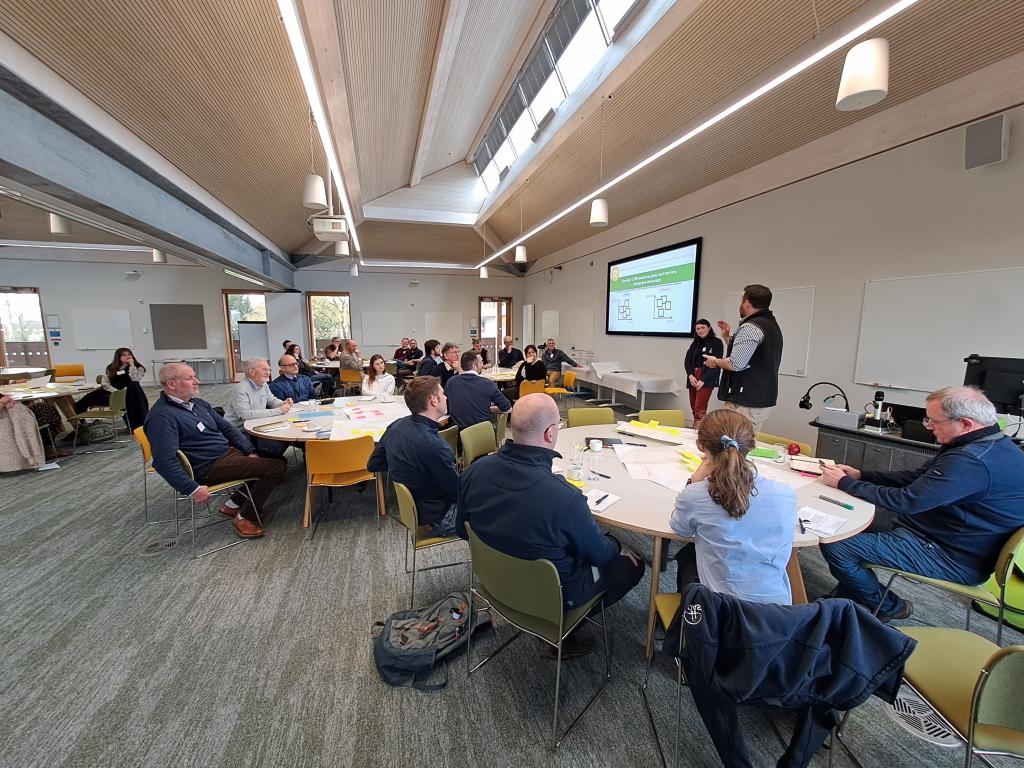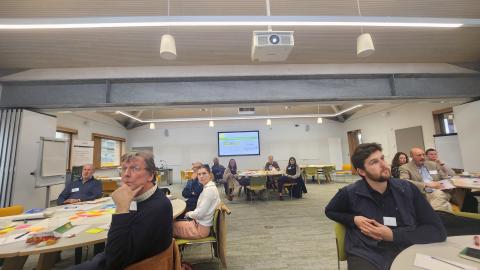IPM NET Kick-off meeting
Diving into the core principles of Integrated Pest Management (IPM), David Felce (Midloe Grange Farm and retired technical advisor for Agrii) provided insights into his IPM approach and posed some critical questions. David emphasised the need for a holistic approach which encompasses monitoring, advice, planning, using strategies and technologies aimed at reducing reliance on conventional pesticides while enhancing crop health and productivity.

Progressing farm-scale IPM poses challenges due to the absence of a universal blueprint or best practices. Successful IPM strategies are not easily transferable and can vary significantly from one farm to another. Equally, it can be difficult to benchmark the development of an individual IPM approach due to the vast number of aspects to look at. David posed the question ‘What level of understanding is required to know if what we are doing is effective?’
Priorities for IPM advancement
In an interactive session, attendees discussed IPM goals and associated challenges in meeting them. Key discussions included:
- Optimised inputs: Reducing the need for pesticides and applying pesticides only when necessary and in targeted ways can reduce unnecessary chemical input while maintaining effective pest control. Data driven informed decisions about what, when and where to apply inputs can lead to more precise and efficient use of resources.
- Enhanced biodiversity: Promoting natural predators, parasitoids and other beneficials by providing habitats and resources can reduce the need for chemical intervention.
- Economics: Gathering evidence of consistent profitability of IPM will increase confidence in lower input practices. Financial incentives for IPM can provide a safety net and reduce risk for those transitioning from conventional farming to IPM.
- Benchmarking: All farms are using IPM. To assess IPM advancement we need to establish a hierarchy of priorities, starting with small changes and quick wins and leading to landscape scale IPM. To achieve this, IPM needs to be quantified and benchmarked to assess how practices impact profitability and production year on year.
- Resilience: Variable growing conditions which impact on pests, weeds and diseases, highlight the need for adaptive and resilient IPM strategies. Therefore, there must be flexibility in an IPM approach: continued monitoring and adaptation. Access to relevant tools and resources can help with this.
- Communication: The amount of expertise expected of farmers to implement and assess the outcome of IPM is extensive. To share the responsibility, greater collaboration between farmers, advisors, researchers, policy makers and supply chains is essential.
IPM – How to address the challenges
Why are there still so many unanswered questions relating to IPM efficacy and economics? Dr. Neil Paveley focused on addressing the challenges associated with IPM research. Neil demonstrated how research compartmentalises the multifaceted aspects of IPM, meaning that research is often too simplified to give generalised practical insight. Neil explained how we can bridge this gap, sharing information on what works in IPM and gathering data from tramline trials and field observations. Neil introduced IPM NET, a new knowledge exchange network developed by ADAS which aims to better understand the effectiveness of IPM approaches on farm yield, profitability and sustainability through a combination of data analysis, in-field trials and improved communication between stakeholders.
Andrew Christie from the James Hutton Institute then shared results from the IPMWORKS project and a group of farmers that have been integrating new technologies and practices into existing IPM frameworks, gathering data to review how effective the approach is and benefitting from sharing this information within networks of farmers and advisors across Europe. Andrew gave examples of farmer-led field trials of a biofortification strategy in winter wheat and companion cropping in oilseed rape and how to quantify the effectiveness of these approaches.
Despite the challenges, advancing IPM is crucial for sustainable and profitable agriculture, minimising the negative impacts of pest management on the environment. Collaboration among researchers, advisors, farmers, and policymakers is essential for developing and promoting IPM strategies that are effective, economically viable, and environmentally sustainable across diverse agricultural systems.
IPM NET
With this in mind, we are setting up an IPM knowledge exchange network for farmers and advisors with 3 main objectives:
- Increase access to the tools and knowledge required to plan and monitor IPM in action.
- Collect and analyse data from farms within IPM NET to quantify the impact of IPM on key metrics particularly around productivity and benefits to yield.
- Share information and experiences as a community across farms and across crops.
Currently, we are recruiting farmers and advisors with extensive or limited experience in IPM, who are keen on exploring the development of a knowledge exchange network. If you are growing wheat or barley in the current growing season (2023-2024), are willing to share agronomic data on your field(s) and would like to have your say on developing the network – please get in contact IPMNET@ADAS.CO.UK or register using this link.
IPM NET pilot membership is free. Members will complete an IPM plan, submit agronomic and observation data via their member journal and receive a bespoke IPM benchmarking report. Members will be invited to an end-of-season conference where we will review trends over the year and share insight of farmers and advisors.
All submitted data will be securely stored, analysed by ADAS and never shared without informed consent. An annual review of the dataset will be presented to members, to facilitate farm- and field-specific ideas to enhance IPM.

Attendees at the IPM NET Kick-off meeting discussing practical solutions to address key challenges in advancing IPM.
 The IPM NET Pilot project is being funded by Defra.
The IPM NET Pilot project is being funded by Defra.


